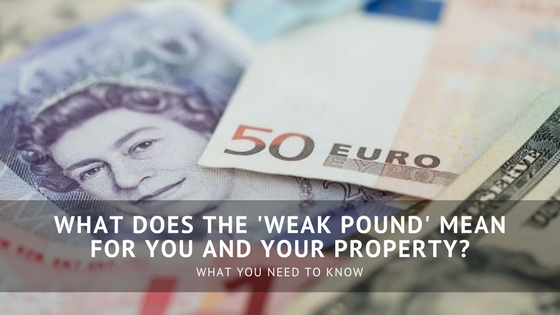
What does the ‘weak pound’ mean for you and your property?
While the thought of owning a property in a sunny European country like Spain does sound extremely appealing, what doesn’t sound so great is the cost implications that go along with it.
If you pay any attention to currency rates you’ll probably have noticed that the cost of exchanging sterling for euros is seemingly higher as of late.
The pound has just entered an 11-month low at 1.11 euro and financial forecasters predict things could dip even further.
What does this mean for people who own property abroad?
Political uncertainty
One of the key factors contributing to the weak pound is of course Brexit. Ever since the UK voted to leave the European Union last June, the pound has been buying fewer euros.
This isn’t the only political element that is affecting the weakness of the pound, or, perhaps more accurately, the strength of the euro.
The French presidential election that took place earlier this year also produced a lot of political uncertainty, driving the euro lower.
However once, it became clear that Emmanuel Macron was likely to win, these concerns were forgotten, leaving the euro in a much stronger position.
Brexit has left us all feeling the pinch and facing financial uncertainty, especially for those who own property abroad as repaying mortgages could prove to be more difficult.
Strengthening euro
It’s important to understand that any event that takes place and makes the euro seem more attractive will have a direct, negative impact on the pound.
The euro has been boosted recently due to the market anticipation that the European Central Bank will start cutting back on its Quantitative Easing programme.
This has resulted in more euros in the Eurozone economy, which in turn has boosted performance. However, if the programme changes, pressure on the euro will lift which will change the game once again and could lead to the pound gaining back some of its lost ground.
Keeping interest rates low
In terms of investment, low-interest rates are usually seen as a negative as they deter foreign investors and make currency seem less attractive.
Many economic observers predicted that the Bank of England Monetary Policy Committee meeting last month would see action in favour of raising interest rates. This wasn’t the case, so a low-interest rate persists and the pound continues to decrease in value. Whether this changes as the political picture becomes clearer remains to be seen but, for the short term at least you’ll likely notice an increase in cost when buying or travelling overseas.
With interest rates across Europe rising, owning property could become more expensive.